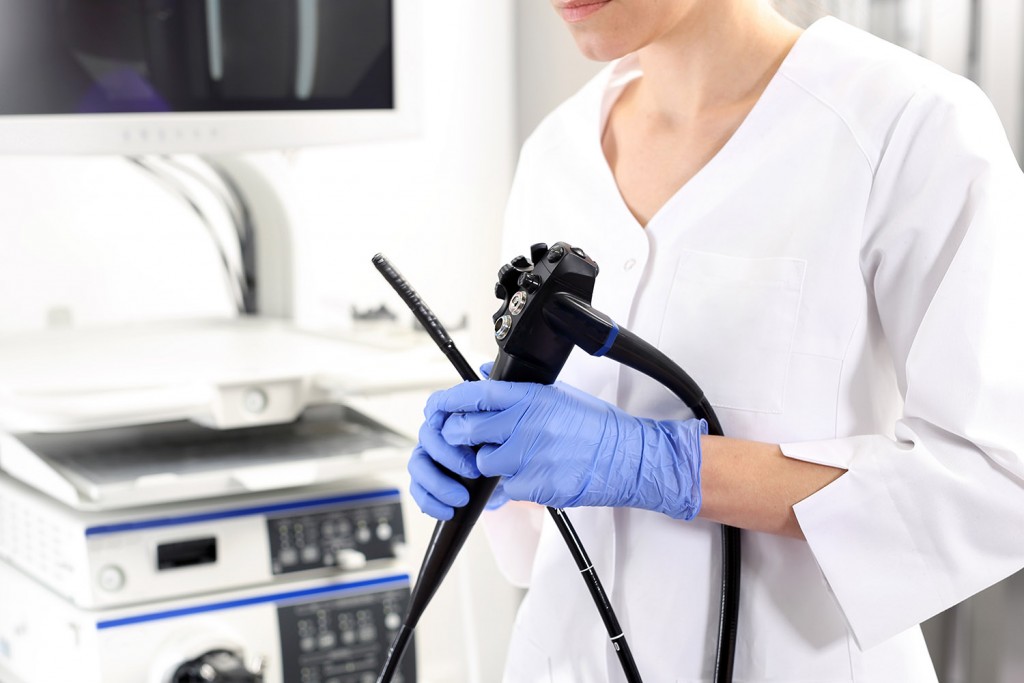
Colon cancer remains the third most common cancer in both men and women in the United States. It is the second leading cause of cancer-related deaths after lung cancer. In 2014, there were 137,000 new cases leading to 50,000 deaths. There is approximately a 5% lifetime risk of developing colon cancer as a person living in the United States. Based on these facts, colon cancer screening is recommended for average risk individuals starting at age 50. Clearly, high risk-individuals (i.e. those with a family history of colon cancer or polyps, inflammatory bowel disease, or a personal history of colon cancer/polyps) benefit from earlier and/or more frequent colonoscopies. Despite the fact that colon cancer is almost entirely preventable through screening, only approximately 60% of Americans undergo colon cancer screening. Within the state of Florida, Miami-Dade county has amongst the lowest screening rates with only 43-55% of residents being screened.
Colonoscopy is presently the gold standard by which all other modalities of colon cancer screening are measured. However, as Table 1 demonstrates, there are other approved colon cancer screening modalities available. Despite their inferiority when compared to colonoscopy, they are acceptable alternatives in individuals who are unable or unwilling to undergo a colonoscopy. These alternatives are as follows:
Annual Guaiac Fecal Occult Blood Test (gFOBT). In this test, two stool samples are obtained from three consecutive bowel movements. One must avoid meats, vitamin C, and citrus for three days prior to the collection. Also, non-steroidal anti-inflammatory drugs (other than aspirin 81 mg/day) are to be avoided for seven days. This test’s sensitivity for colon cancer is approximately 35%. Due to this suboptimal sensitivity, along with the need for dietary restrictions, it has been replaced by Fecal Immunochemical Testing (FIT).
Annual Fecal Immunochemical Testing (FIT). In this exam, two separate bowel movements are sampled with a brush (if loose, the toilet water may be sampled). No dietary or medication restrictions are required. The sensitivity of FIT for colon cancer is approximately 80%. Due to its ease of use and improved sensitivity, FIT has largely replaced gFOBT as a stool-based colon cancer screening method.
Flexible Sigmoidoscopy every 5 years. In this exam, a preparation consisting of two enemas removes stool from the last 40 cm of the colon. A flexible instrument is inserted through the rectum (typically without anesthesia) and any visualized pre-cancerous polyps are removed. If a pre-cancerous polyp (i.e. adenoma) is found, then a complete colonoscopy is typically recommended. The main limitation of a flexible sigmoidoscopy is its lack of complete colonic examination. Its benefit is a simpler preparation when compared to a colonoscopy, lack of requirement for anesthesia, and lower procedural risk versus colonoscopy.
Air-contrast Barium Enema (ACBE) every 5 years. In this radiologic exam, an oral laxative is used to prepare the colon. A radiologist or radiology technician inserts a small tube into the rectum and the colon is filled with contrast and air. The exam is performed without anesthesia and typically last 20-40 minutes. Its sensitivity for colon cancer is between 85 and 97%. The benefit of ACBE is that it does not require anesthesia and can be performed in patients with anatomic limitations (i.e. adhesions) making a traditional colonoscopy difficult. However, it can be limited by a suboptimal colonic preparation that can adversely affect its sensitivity.
CT Colonography (Virtual Colonoscopy) every 5 years. In this radiologic study, an oral laxative is once again used to prepare the colon. A small tube is inserted in the rectum and air is used to distend the colon. Subsequently, a CT scan is performed allowing visualization of the distended colonic lumen. This exam typically lasts 10 minutes and is performed without anesthesia. It has a sensitivity of 96% for colon cancer. Although its sensitivity for colon cancer is good, it does entail receiving radiation as part of a radiologic exam. Clearly, if an abnormality is found on this exam, a traditional colonoscopy is required for further evaluation.
Stool DNA every 3 years. The most recently approved method for colon cancer screening is stool DNA testing. This exam consists of testing a stool sample for DNA mutations associated with colon cancer. A study performed in 2014 revealed that stool DNA testing demonstrated a sensitivity of 92% for colorectal cancer. However, the cost associated with stool DNA testing is significantly greater than that of other approved stool exams (i.e. gFOBT, FIT).
In summary, although colonoscopy is the gold standard for colon cancer screening given its proven effectiveness in decreasing incidence of this cancer by 30% over the past decade, other alternatives do exist. Adherence to colon cancer screening recommendations, regardless of the method, is the most important factor leading to a reduction of this common malignancy.
Featured Doctors
